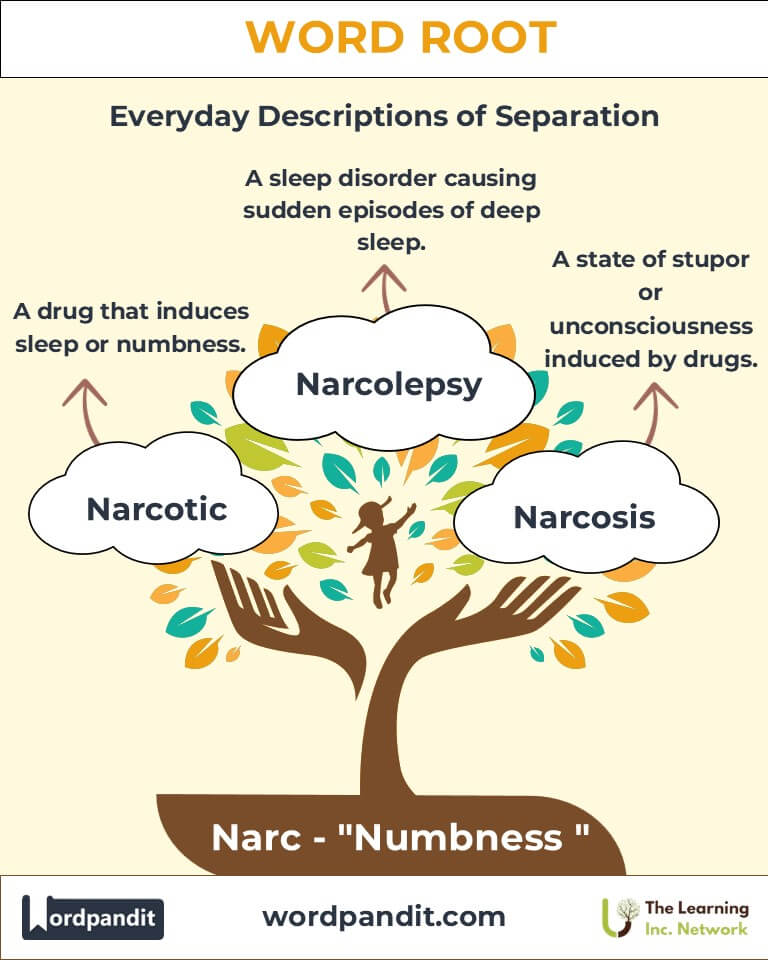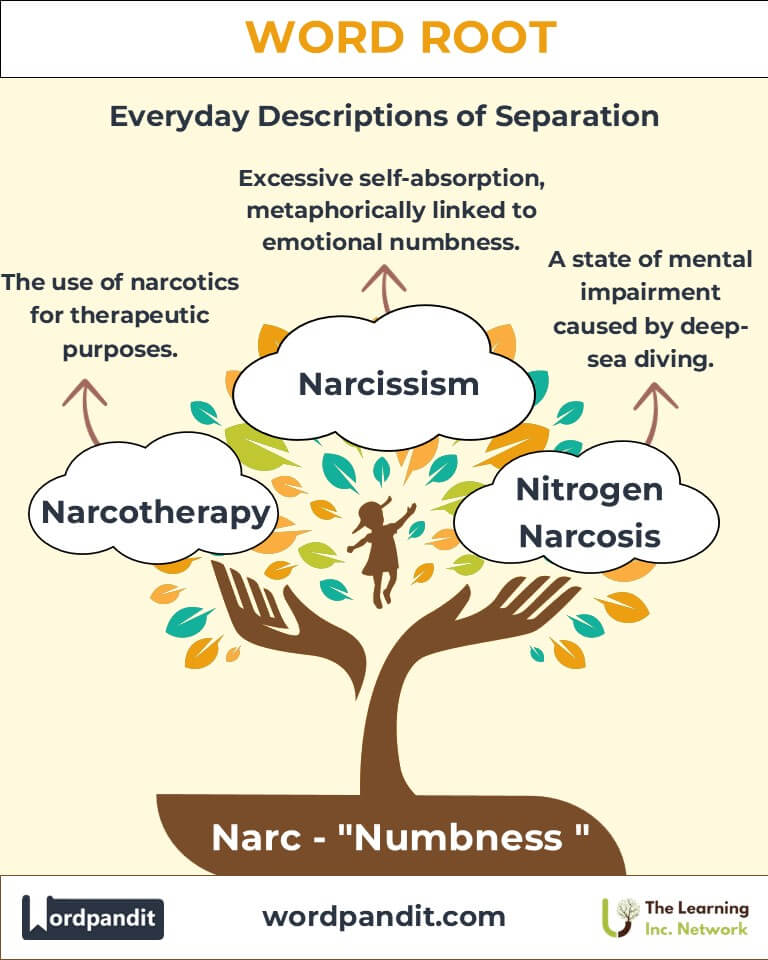Narc: Exploring the Root of Numbness in Language and Medicine
Byline: Dive into the fascinating world of the word root "narc", derived from the Greek word narkē meaning "numbness" or "stupor." This root forms the foundation of terms like narcotic and narcolepsy, revealing its profound connection to medicine, sleep disorders, and historical linguistics.

Table of Contents
- Introduction: The Essence of Narc
- Etymology and Historical Journey
- Mnemonic: Unlocking the Power of Narc
- Common Narc-Related Terms
- Narc Through Time
- Narc in Specialized Fields
- Illustrative Story: Narc in Action
- Cultural Significance of the Narc Root
- The Narc Family Tree
- FAQs About the Narc Word Root
- Test Your Knowledge: Narc Word Root Quiz
- Conclusion: The Living Legacy of Narc
Introduction: The Essence of Narc
Imagine the feeling of numbness overtaking the senses, whether from medication or extreme fatigue. The word root "narc" encapsulates this sensation, symbolizing states of stupor or sleep. Pronounced as "nark", this Greek root has influenced terms in medicine and psychology, highlighting its enduring relevance across fields.

Etymology and Historical Journey
The root "narc" originates from the Greek word narkē, meaning "numbness" or "torpor." Ancient Greek physicians used this term to describe the effects of sedatives and natural opiates. As the understanding of medicine evolved, "narc" became a linguistic cornerstone for terms describing sleep, stupor, or substances inducing such states.
Mnemonic: Unlocking the Power of Narc
Picture a nurse administering a narcotic, calming a restless patient into a peaceful stupor. The soothing, numbing effect of the medication is a vivid representation of the "narc" root.
Mnemonic Device:
“Narc calms and numbs, leading to tranquil slumbers.”
Common Narc-Related Terms
- Narcotic (nahr-kot-ik): A drug that induces sleep or numbness.
Example: “Doctors prescribed a mild narcotic for her post-surgery pain.” - Narcolepsy (nahr-ko-lep-see): A sleep disorder characterized by sudden bouts of deep sleep.
Example: “Her narcolepsy made driving nearly impossible.” - Narcosis (nahr-koh-sis): A state of stupor or unconsciousness induced by drugs.
Example: “The diver experienced nitrogen narcosis at great depths.” - Narcissism (nahr-sih-siz-um): While related more metaphorically, this term reflects a “numbing” self-absorption.
Example: “His narcissism made him oblivious to others’ needs.” - Narcotherapy (nahr-koh-thair-uh-pee): The use of narcotics for therapeutic purposes.
Example: “Narcotherapy is sometimes employed in severe mental health treatments.”
Narc Through Time
- Narcotic: Once synonymous with sleep-inducing herbs, this term now refers to controlled substances with pain-relieving properties.
Evolution: From natural remedies to regulated pharmaceuticals. - Narcolepsy: Coined in the 19th century, its meaning has remained consistent, reflecting advancements in diagnosing sleep disorders.
Narc in Specialized Fields
- Medicine:
- Narcotics manage pain but require strict regulation due to their addictive properties.
Example: Opioids like morphine are classified as narcotics.
- Narcotics manage pain but require strict regulation due to their addictive properties.
- Neurology:
- Narcolepsy highlights the intersection of "narc" in sleep disorders and brain function.
- Psychology:
- Narcissism metaphorically connects to emotional numbness and self-focus.
Illustrative Story: Narc in Action
Dr. Elena, a neurologist, treated James, a young man with narcolepsy. James struggled with sudden sleep episodes that disrupted his life. Using advanced diagnostics and narcotherapy, Dr. Elena helped him manage the condition. Meanwhile, she educated his family about the safe use of narcotics to ensure effective treatment. Their journey together reflected the deep significance of the "narc" root in understanding and alleviating human suffering.
Cultural Significance of the Narc Root
The concept of numbness, captured by "narc," resonates culturally as well. Ancient healers regarded narcotics as divine tools for alleviating pain, while modern narratives often caution against their misuse. Additionally, the metaphorical use of "narc" in terms like narcissism highlights its broader psychological and societal implications.

The Narc Family Tree
- Somn- (Latin: "sleep"):
- Somnolent: Sleepy or drowsy.
- Insomnia: Inability to sleep.
- Hypn- (Greek: "sleep"):
- Hypnosis: A trance-like state resembling sleep.
- Sopor- (Latin: "deep sleep"):
- Soporific: Inducing sleep.

FAQs About the Narc Word Root
Q: What does "narc" mean?
A: The root "narc" means "numbness" or "stupor," originating from the Greek word narkē. It is used to describe states of physical or mental insensibility, often induced by drugs or sleep disorders.
Q: What is narcolepsy?
A: Narcolepsy is a neurological disorder characterized by sudden, uncontrollable episodes of deep sleep during the day. It often involves cataplexy, which is a sudden loss of muscle tone triggered by strong emotions.
Q: Are all narcotics addictive?
A: Many narcotics, such as opioids, have addictive properties due to their effect on the brain's reward system. However, when used under strict medical supervision, they are effective for managing severe pain with minimal risk of dependency.
Q: What does narcosis mean?
A: Narcosis refers to a state of stupor or unconsciousness induced by drugs or specific environmental factors, such as breathing certain gases under high pressure (e.g., nitrogen narcosis during deep-sea diving).
Q: Does "narcissism" relate to numbness?
A: Metaphorically, yes. Narcissism, derived from the myth of Narcissus, signifies emotional numbness to others’ feelings due to excessive self-absorption. While it doesn’t refer to physical numbness, the self-centeredness can lead to emotional detachment.
Q: How did the word root "narc" enter medical terminology?
A: The root "narc" entered medical usage through ancient Greek medicine, where narkē was used to describe the effects of sedatives. Over centuries, it became a standard prefix in terms like "narcotic" and "narcosis."
Q: What is nitrogen narcosis?
A: Nitrogen narcosis, often called "rapture of the deep," occurs when nitrogen builds up in the bloodstream during deep-sea diving under high pressure. This causes a temporary state of stupor, dizziness, and impaired judgment.
Q: Can non-narcotic drugs cause numbness?
A: Yes, non-narcotic drugs like anesthetics or certain antidepressants can also induce numbness or a loss of sensation without being classified as narcotics.
Test Your Knowledge: Narc Word Root Quiz
1. What does the root "narc" mean?
2. What is narcolepsy?
3. Which field frequently uses the term narcotic?
4. What does narcosis describe?
5. Which term describes excessive self-absorption?
Conclusion: The Living Legacy of Narc
The root "narc" weaves a rich tapestry through language and medicine, embodying the states of numbness and stupor that define human experience. From healing therapies to cautionary tales, "narc" reflects humanity’s ongoing journey with its complexities. By understanding this root, we gain insight into a vital aspect of our linguistic and medical heritage.














